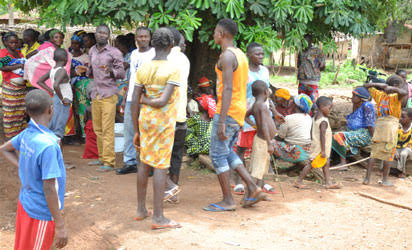In a humanitarian crisis of escalating proportions, more than 20,000 refugees have fled the Republic of Cameroon, inundating Taraba State, Nigeria, in their quest for asylum.
The refugees, currently situated across five local government areas—Sardauna, Kurmi, Gashaka, Ussa, and Takum—are facing dire circumstances and are urgently seeking assistance from federal and state governments, as well as non-governmental organizations to alleviate their plight.
The Taraba State government has pledged to ensure the safety and protection of the refugees while they wait for peace to be restored in their home country.
However, the situation has evolved dramatically since March 2020, when 7,000 refugees initially sought asylum in the state.
Now, the number has more than tripled, placing immense strain on resources related to feeding, education, shelter, health, and security in both the host communities and the state government.
Acknowledging the challenges at hand, the Taraba State government has convened a multi-stakeholder meeting to enhance the protection and delivery of humanitarian assistance to refugees and vulnerable host community members.
The overstretched state government faces difficulties in meeting the increasing demands, with issues ranging from insecurity to inadequate health facilities and dilapidated schools.
Efforts by the United Nations High Commission for Refugees, in collaboration with partners, to call for a ceasefire in North-Western and South-Western provinces of Cameroon have yielded no positive outcomes.
The insecurity, challenging terrains, and insufficient infrastructure persist as obstacles to providing adequate protection for the refugees in Taraba.
Governor Agbu Kefas, represented by his deputy, expressed gratitude for the support of development partners in building confidence and assured that his free education initiative extends to the refugees.
However, he acknowledged the overwhelming nature of the pockets of insecurity affecting the state, pledging to do his best to foster peaceful coexistence between the two neighboring regions.
The meeting aims to draw recommendations that will facilitate the seamless integration of humanitarian services for refugees and vulnerable community members, aligning with global best practices on refugee management.
Development partners received commendation for their significant contributions toward safeguarding the refugees, underscoring the importance of collaborative efforts in addressing this pressing humanitarian challenge.
Do you want to share a story with us? Do you want to advertise with us? Do you need publicity for a product, service, or event? Contact us on WhatsApp +2348183319097 Email: platformtimes@gmail.com
We are committed to impactful investigative journalism for human interest and social justice. Your donation will help us tell more stories. Kindly donate any amount HERE



